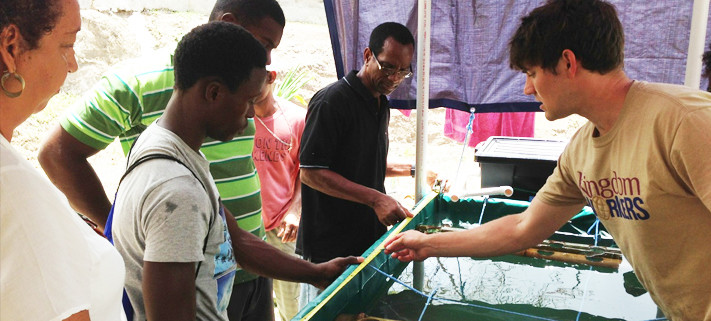Grace in Grenada becomes an aquaponics hub
“It’s not just raising fish but fishers of men,” says Daniel Rautenberg, pastor at Grace, Grande Anse, Grenada.
Rautenberg is referring to Grace’s aquaponics project, which was launched in May. Aquaponics is the practice of raising fish and growing vegetables in a self-contained system.
Dr. Robert Anderson, professor of biology at Wisconsin Lutheran College (WLC), Milwaukee, Wis., developed the idea of implementing aquaponics at Grace. Anderson is the son of a missionary and has had a love for missions throughout his life. As a member of the WELS Board for World Missions since 2007, he has visited many WELS mission fields and talked with nationals about their church and community needs.
“What I have noted,” says Anderson, “is that a key aspect of spreading the gospel is the need for methods to engage with the local community. On some mission fields, community engagement involves teaching English or providing study centers. As I became aware of aquaponics, it occurred to me that aquaponics could be an outreach tool for our mission congregations in developing countries.”
Anderson secured a grant from WLC to pursue the idea of developing a simplified aquaponics system that could be built by nationals on the mission field. Anderson partnered with Kingdom Workers and targeted Grace in Grenada as the first mission to begin this project because there is a Kingdom Workers coordinator on the island.
As Ryan Hellpap, Kingdom Workers’ field manager in the Caribbean, explains, “One of the key roles I play in helping Grace is to alleviate the strain on local mission resources when an outside project like aquaponics is introduced into an outreach program. My biggest role then was to network on the island for membership, government, and community support; plan the event with the WLC team; and facilitate the training events.”
Anderson, with the help of WLC student Marilee Gloe, met with government officials and local farmers in Grenada in 2013 to gauge the potential for aquaponics in the community. Then this May, Anderson traveled to Grenada with 2015 WLC graduate Zachary Pappenfuss, who led five workshops on the technical aspects of aquaponics for members of Grace and its community. By the time Anderson and Pappenfuss left, a fully functional aquaponics system was in place on Grace’s campus.
“In just one week,” Hellpap reports, “aquaponics brought 54 residents to the campus who had not known or been to Grace before. Twenty of them attended worship services at the end of the week of training. Six participants have begun attending Bible information classes with the intention to join the church. These are the immediate blessings. Behind the scenes, the relationships that were created through the development and execution of the program will enable Grace to conduct beneficial programs in the future.”
Hellpap also says that the aquaponics system is a blessing to the community because it is “providing a sustainable food source that is resilient enough to provide sustenance through natural disasters like hurricanes, while helping to alleviate the problems of overfishing and degradation of the coral reefs. At the same time the process allows for a home-based business to help address the 20 percent-plus unemployment rate of the island.”
Hellpap says that three things are essential for any mission congregation considering an aquaponics program. First, conduct a community needs assessment. Second, understand the cultural significance of fish within a culture. “Here, fish is a main staple of the diet and the act of fishing is a cultural foundation,” notes Hellpap. “Therefore, the idea of raising fish is appealing as the fish population is changing in the ocean. Finally, patience, patience, patience. This program can often seem slow in developing. Ministries must identify strong local leaders in the membership to lead this and trust that they can drive it.”
Future aquaponics sites may include Indonesia, Zambia, and Malawi.
Pappenfuss concludes, “A project like this in a WELS mission congregation offers the benefit of reaching out using not only spiritual nourishment and sustainability, but also physical nourishment and sustainability. By incorporating aquaponics, Grace has positioned itself to be an aquaponics hub for the island of Grenada.”
What is aquaponics? Dr. Robert Anderson, creator of the aquaponics project at Grace in Grenada, explains, “Aquaponics combines aquaculture (fish farming) and hydroponics (growing plants in water) in a semi-closed system. Water from the fish tank that contains waste produced by the fish is pumped into a grow bed where plants are suspended in the water and use the fish waste as fertilizer. In this way the plants clean the water so it can drain back into the fish tank. One pump circulates the water through the system over and over again as the fish and plants grow, so you can produce good protein and vegetables and use only a small amount of water.”
Author:
Volume 102, Number 9
Issue: September 2015
Copyrighted by WELS Forward in Christ © 2021
Forward in Christ grants permission for any original article (not a reprint) to be printed for use in a WELS church, school, or organization, provided that it is distributed free and indicate Forward in Christ as the source. Images may not be reproduced except in the context of its article. Contact us




